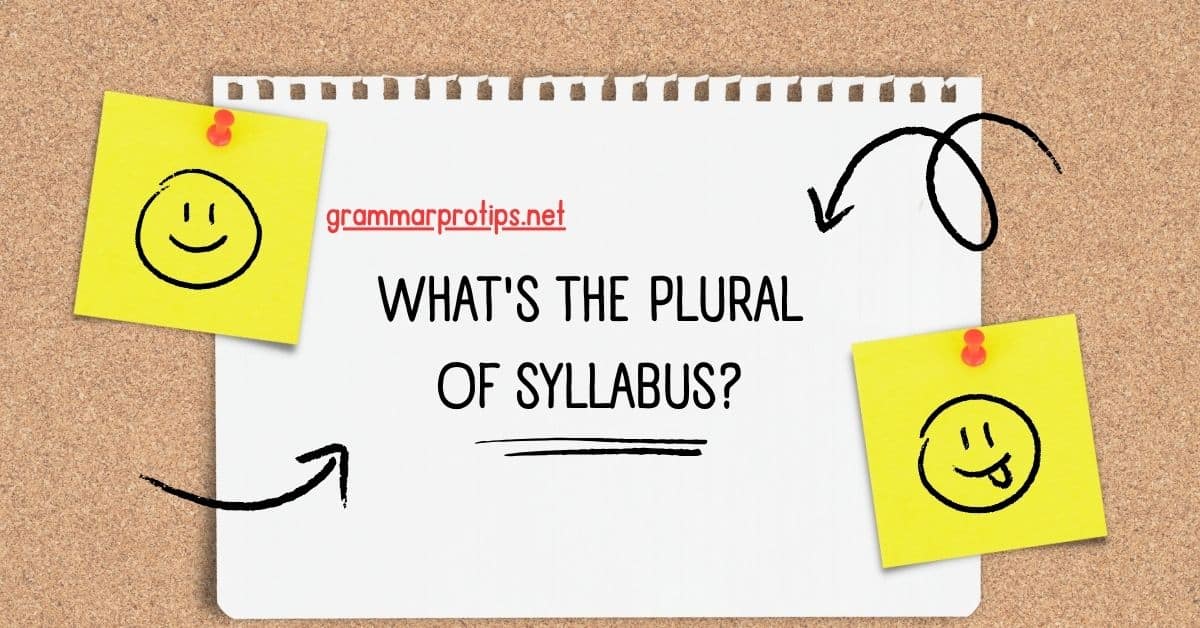The English language has its fair share of tricky rules and exceptions, and one of the most commonly debated aspects involves the plural of syllabus. Whether you’re an academic, a student, or simply someone trying to figure out the correct way to refer to multiple syllabi, you’ve likely encountered the question: Syllabuses or Syllabi?
In this article, we’ll delve into the details of this issue, comparing syllabuses vs syllabi, exploring the syllabus plural form, and offering real-life examples to help you understand the situation better. Let’s unravel this mystery step by step!
Syllabus Singular vs. Syllabuses or Syllabi?
Before diving into the syllabus plural, let’s quickly establish the basics. Syllabus is a singular noun, often used in academic settings to refer to a detailed outline or plan of what will be taught in a course. But what happens when we need to talk about more than one?
- Syllabus Singular: Refers to one course outline.
- Example: “The professor handed out the syllabus for the semester.”
- Syllabi (pronounced “sy-LAB-eye”) is often considered the more formal or traditional plural form.
- Syllabuses is the regular plural form, adhering to the standard English convention of adding an “es” to form plurals for nouns ending in -us.
But which one is correct? The truth is, both forms are accepted and commonly used. However, let’s break down the nuances.
The Plural of Syllabus: Syllabi vs Syllabuses
When it comes to the plural of syllabus, you’ll find that English speakers sometimes prefer syllabi and other times syllabuses. The difference largely comes down to formality and tradition.
Syllabi: The Latin Way
Syllabi follows the tradition of Latin plurals, which is why it is often preferred in academic contexts. Words ending in -us like alumnus (alumni), cactus (cacti), and syllabus (syllabi) take this form when pluralized.
For example:
- Email Example:
- Subject: Clarification on Multiple Course Outlines
- Dear Dr. Foster,
- “I have reviewed the syllabi for the upcoming semester and I wanted to clarify a few points regarding the required readings. Could you kindly confirm if we need to purchase the books listed under both of the syllabi for your courses?”
- Best regards,
- Sarah
In this context, syllabi feels appropriate because Sarah is communicating with a professor, a formal setting where traditional grammar rules hold weight.
Syllabuses: The Regular Plural
On the other hand, syllabuses follows standard English pluralization rules. In modern usage, this version has become more common, especially in less formal settings. You’ll find syllabuses used in many written documents, including newspapers, casual communications, and online articles.
For example:
- Email Example:
- Subject: Request for Course Outlines
- Dear Mr. Thompson,
- “I was hoping to receive the syllabuses for your courses as soon as possible. I understand you might still be updating them, but I would appreciate any available drafts.”
- Thank you,
- Liam
In this casual setting, syllabuses sounds completely natural, and Liam doesn’t need to worry about adhering to strict academic conventions.
Which One Should You Use?
Both syllabi and syllabuses are correct. However, it’s helpful to know when to use each:
- Syllabi: More common in academic and formal writing. If you want to sound traditional and precise, go with syllabi.
- Syllabuses: More common in everyday language and less formal contexts. If you want to keep it simple and follow modern conventions, syllabuses is just fine.
The Syllabus Plural in Different English Dialects
In terms of the plural of syllabus, there are subtle differences in usage between UK and US English.
- Plural of syllabus UK: In British English, you might encounter syllabi more frequently, particularly in formal or academic contexts.
- Plural of syllabus US: In American English, syllabuses is becoming the norm, but both forms are still accepted.
In any case, both versions are understood worldwide, so you won’t confuse anyone if you use either form.
Analysis of Plural Forms in Similar Words
The pluralization of syllabus might seem confusing because of its Latin origins. Let’s look at a few other words to see how they follow similar rules:
| Singular | Plural |
|---|---|
| Focus | Foci |
| Cactus | Cacti |
| Formula | Formulas |
| Barrack | Barracks |
| Deer | Deer (no change) |
| Analysis | Analyses |
Notice that some words like deer don’t change in the plural, while others follow the Latin rule, as with cacti. This inconsistency can be a challenge, but understanding the pattern can help you know when to use the syllabi pronunciation (pronounced “sy-LAB-eye”) or the simpler syllabuses.
Plural of Syllabus: Oxford English Dictionary and Other References
The plural of syllabus Oxford English dictionary offers an interesting viewpoint. It lists both syllabi and syllabuses as acceptable plurals. The choice depends on whether you’re adhering to traditional linguistic norms (Latin-based) or opting for the modern, regular pluralization.
Syllabuses or Syllabi in Modern Texts
If you were to check a syllabus plural PDF, you might find that universities tend to use syllabuses more often than syllabi, even in formal documents. This shift reflects a broader trend in English toward regular plural forms.
For example:
- Syllabuses or syllabi? In recent years, educational institutions and publishers have adopted syllabuses in many contexts because it feels more natural in contemporary writing. While syllabi still holds sway in more traditional settings, syllabuses is often the go-to option.
How to Decide Which to Use: A Quick Guide
| Context | Preferred Form |
|---|---|
| Formal Academic Writing | Syllabi |
| Informal or Casual Use | Syllabuses |
| British English | Syllabi |
| American English | Syllabuses |
Common Mistakes with Plural Forms
A few common errors often crop up when discussing the syllabus plural. Let’s explore some of these and how to avoid them:
- Incorrect: “The syllabuses were handed out at the start of the course.”
- Correct: “The syllabuses were handed out at the start of the course.”
- Incorrect: “I need the syllabi for all my courses.”
- Correct: “I need the syllabuses for all my courses.”
These mistakes usually happen when people get confused about which form to use. As we’ve discussed, you can use either syllabi or syllabuses, but mixing the two forms together is what’s problematic.
Conclusion: Syllabuses or Syllabi?
When deciding between syllabuses or syllabi, you have flexibility. If you want to stay traditional, go with syllabi. If you prefer a more modern, less formal approach, syllabuses works just fine. Both forms are widely accepted, so you’ll be understood no matter which you choose. However, knowing when and where each form is most appropriate will help you communicate with clarity and precision.
Whether you’re crafting an email to a professor, drafting an academic paper, or simply discussing multiple course outlines with classmates, understanding the syllabus plural forms will help you sound more confident and polished.
By following these insights, you’ll never again be stuck wondering: What’s the plural of syllabus?

Sienna Mauldon is a passionate writer and grammar expert. On her blog, she shares easy-to-follow guides to help readers master grammar rules and improve their writing. With a love for language and teaching, Sienna makes grammar simple and fun for everyone, from beginners to experienced writers.








